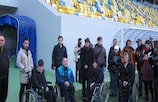Respect Inclusion message promoted in Ukraine
Mittwoch, 7. März 2012
Artikel-Zusammenfassung
The Respect Inclusion initiative is being promoted in Ukraine by the presence of high-profile ambassadors plus a Disabled Friendly Zone competition to engage local businesses.
Top-Medien-Inhalte des Artikels

Artikel-Aufbau
Disabled football fans will share in the excitement of UEFA EURO 2012 in Poland and Ukraine thanks to the Respect Inclusion programme, one of four social projects that together comprise UEFA's Respect campaign for the tournament.
The Respect Inclusion initiative has recently gained a higher profile thanks to a series of promotional events in Ukraine and the unveiling of its own project ambassadors in both host countries.
Three of Ukraine's four host cities – Kharkiv, Lviv and Kyiv – hosted promotional press conferences that also provided a launch pad for the Disabled Friendly Zone competition which, under the umbrella of Respect Inclusion, will leave a legacy by raising public awareness of the challenges facing disabled people.
Moreover, the ambassadors for Respect Inclusion in Ukraine were announced: Oleksiy Mykhaylychenko, the former USSR and Ukraine player and coach, who played in the EURO '88 final for the Soviet Union against the Netherlands; Olexandr Shovkovskiy, long-serving FC Dynamo Kyiv and Ukraine goalkeeper; and Volodymyr Nechyporuk, the general producer of the Ukrainian Fashion Week. Darius Dziekanowski, the former Poland centre-forward, is the campaign's ambassador in Poland.
The ambassadors share the vision of creating equal access, and firmly believe that disabled people have the right to enjoy football, sports and all forms of entertainment in the same way as everyone else. Being well-known and highly respected for their individual achievements in their countries, the ambassadors will propagate this message to the wider society in the hope that UEFA EURO 2012 will become a positively unforgettable experience for disabled fans.
The Disabled Friendly Zones will engage local businesses, with service providers such as restaurants, hotels, transport hubs, banks, cafes and bars and so on to be identifiable as accessible venues for disabled people. By awarding a certificate and a window sticker for public display to each "Disabled Friendly Zone or Venue", the aim is to encourage local competition and encourage businesses to ensure accessible and welcoming settings within their premises.
Some 20–25 volunteers in each host city will assess venues and public places, following a developed assessment tool/template. This information then goes to online access guides. Venues that meet certain criteria and can be called "Disabled friendly" get a special sticker – with yellow signs for Poland and blue for Ukraine.
Venues that do not meet accessibility criteria are given recommendations on how to improve access (some simple and low-cost solutions) and are invited to participate in the competition once they are made more accessible. In May, the most accessible venues will be awarded special prizes at prestigious events organised in both countries.
General issues regarding access for disabled tourists in Ukraine have come up for discussion, and stadium tours were organised in Kharkiv and Lviv for journalists.
UEFA is working with the Centre for Access to Football in Europe (CAFE) to manage three separate Respect Inclusion initiatives for UEFA EURO 2012: Football with No Limits; the Showcase Games – also involving the Special Olympics in Poland and Ukraine's National Sports Committee for Disabled People; and the UEFA EURO 2012 Tournament charity project, inspiring football followers and other benefactors to donate money for future inclusion schemes.
UEFA has paved the way in fund-raising terms by committing to donate €3,000 for every finals goal scored. Donations can already be made at: http://euro2012.cafefootball.eu/charity-project.aspx
